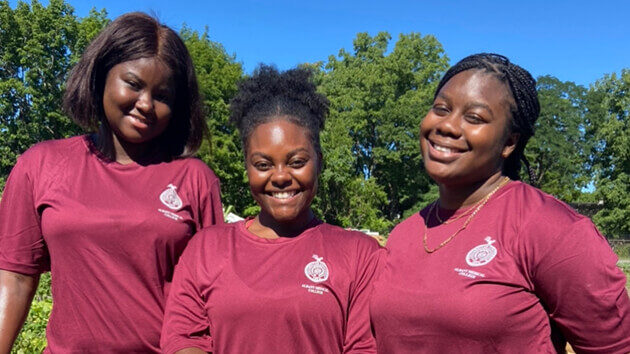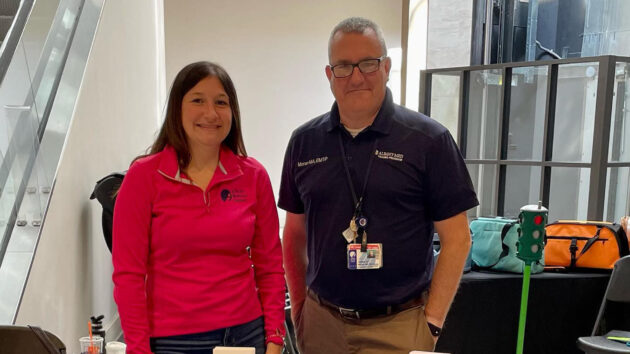Health System's Impact in the Community

How the Albany Med Health System Makes an Impact
The services provided by the Albany Med Health System extend well beyond the walls of our hospitals. Each member of the health system has a long history of community service and is now driven by a shared mission, working together to expand access to resources across the Capital Region. With the help of community partners, community service programs are a vital component of our mission of caring for and improving quality of life.
Spreading a Message of Safety, 365 Days a Year
The Albany Med Health System has four emergency rooms, including the region’s only Level 1 Trauma Center, located at Albany Medical Center. Our professionals provide critical care to the most severe injuries and illnesses that occur across our region. As part of that mission, trauma education and injury prevention outreach helps prevent or limit these types of illnesses and serious incidents from occurring in the first place.
These outreach efforts include administration of Stop the Bleed classes, a nationwide program from the American College of Surgeons that, in the same mode of emergency CPR, teaches community members how to stop life-threatening bleeding caused by trauma in the critical minutes before professional help arrives.
Along with hosting approximately 40 of these Stop the Bleed courses in 2022 alone, trauma staff have hosted trauma education classes for physicians, advanced practice providers (APPs), and nurses, fall prevention presentations for older adults, and they have even assisted parents with proper installation of car seats at System hospitals.
“When we lead outreach efforts or participate in community events, specifically in areas that may not have as much access to these types of resources, people are appreciative,” said Tom Moran, trauma education, injury prevention, and outreach coordinator. “It’s clear to see the important role the Albany Med Health System plays as a leader in promoting and protecting the health and safety of our community.”
Moran and Ashley Bayly, RN, who leads pediatric trauma education efforts, also provide community outreach on bike safety, fireworks safety, and the dangers of drunk driving around the holidays, including New Year’s Eve.
Keeping Local Athletes on the Field
When an injury occurs to a local athlete, from the slightest of muscle pulls to more serious contact injuries, physicians of the Albany Med Health System are there in support for dozens of high schools and colleges.
Hamish Kerr, MD, Sports Medicine Fellowship Director and Professor of Medicine & Pediatrics, and his sports medicine colleagues have served as physicians for football, soccer, rugby and other sports at the University at Albany and Siena College. They also provide world-class resources and expertise for management of concussions for high school athletes.
The work is more than just a part of the job for Dr. Kerr. Supporting young athletes is a responsibility that touches close to home.
“I have two daughters who play varsity women’s high school soccer,” said Dr. Kerr. “I spend my fall at all their games. I value the time and the opportunity I get to ensure that local athletes are at their best and at full strength when a game begins.”
Their reach extends to the Adirondacks, where Dr. Kerr will serve as physician lead at Whiteface Mountain in Lake Placid for the FISU World University Games in January 2023.
An Education in Giving Back
As part of their education, Albany Medical College students complete a minimum of 40 hours within the college’s Service Learning curriculum. Service Learning differs from community service and volunteerism in that service learning requires long-term participation in community-driven service within agencies and with specific learning objectives in mind.
“The Service Learning curriculum is an education on integrating the social and structural determinants of health into health care practice. These determinants of health have the greatest impact on health outcomes and produce inequities,” said Angela Antonikowski, PhD, associate dean of the Division of Community Outreach and Medical Education.
Students can participate in opportunities such as The Health Equity Project, a program that connects medical students with children in the Department of Pediatrics and community members at local nonprofit agencies. It serves as a chance for medical college students to provide much needed resources and work in settings that can support the health of local community members and children while conversing and connecting about issues that are important to the clients and patients.
“When our students leave Albany Medical College, we want them to have a strong sense of compassion, an understanding of the impact of social determinants of health, and to be committed to improving the health of their community throughout their medical careers,” Dr. Antonikowski said.
